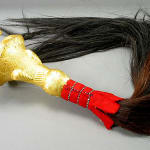Akan Gilt Wooden Flywhisk, 20th Century CE
Wood and Gold
10.75
PF.5897
In most of Africa, flywhisks were carried as prestige regalia and during masquerades. They emphasized both gestures and spoken words. Their materials tended to be made of inherantly status conferring...
In most of Africa, flywhisks were carried as prestige regalia and during masquerades.
They emphasized both gestures and spoken words. Their materials tended to be made of inherantly status conferring materials such as gold.
Domestically, gold was valued by the Akan kings for its decorative and symbolic qualities.
Aside from bringing enormous wealth to the Akan kingdoms through trade, gold was considered the earthly counterpart to the sun and an incarnation of kra, or life force, and was incorporated into a wide spectrum of courtly paraphernalia.
This flywhisk has been carved by a master artist working for the royal court.
The impressive carving is further embellished by a thin layer of gold sheet that has been pounded onto the wood.
They emphasized both gestures and spoken words. Their materials tended to be made of inherantly status conferring materials such as gold.
Domestically, gold was valued by the Akan kings for its decorative and symbolic qualities.
Aside from bringing enormous wealth to the Akan kingdoms through trade, gold was considered the earthly counterpart to the sun and an incarnation of kra, or life force, and was incorporated into a wide spectrum of courtly paraphernalia.
This flywhisk has been carved by a master artist working for the royal court.
The impressive carving is further embellished by a thin layer of gold sheet that has been pounded onto the wood.



